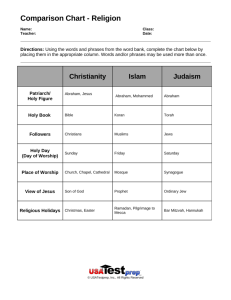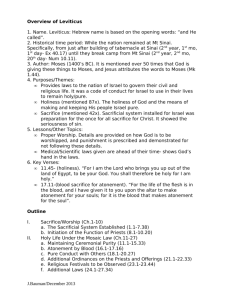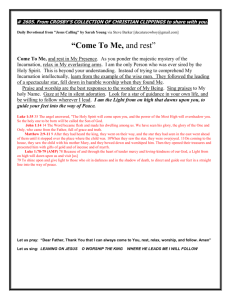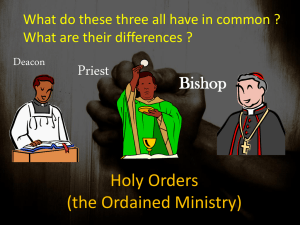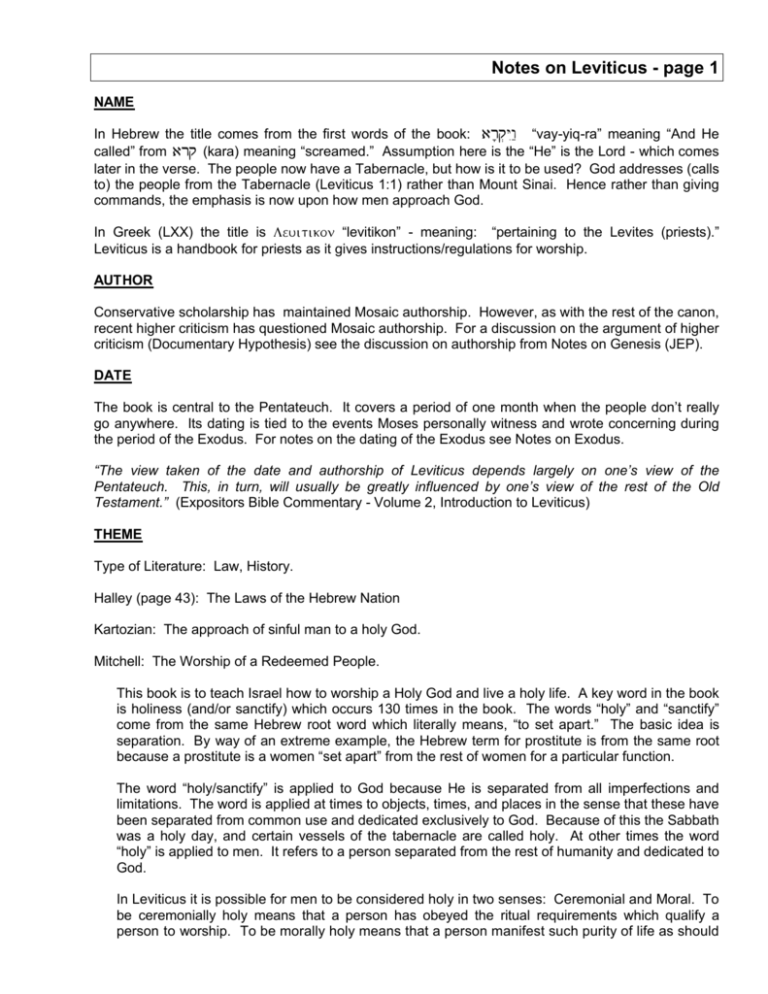
Notes on Leviticus - page 1
NAME
In Hebrew the title comes from the first words of the book: ar*q+Yw­ “vay-yiq-ra” meaning “And He
called” from arq (kara) meaning “screamed.” Assumption here is the “He” is the Lord - which comes
later in the verse. The people now have a Tabernacle, but how is it to be used? God addresses (calls
to) the people from the Tabernacle (Leviticus 1:1) rather than Mount Sinai. Hence rather than giving
commands, the emphasis is now upon how men approach God.
In Greek (LXX) the title is Leuitikon “levitikon” - meaning: “pertaining to the Levites (priests).”
Leviticus is a handbook for priests as it gives instructions/regulations for worship.
AUTHOR
Conservative scholarship has maintained Mosaic authorship. However, as with the rest of the canon,
recent higher criticism has questioned Mosaic authorship. For a discussion on the argument of higher
criticism (Documentary Hypothesis) see the discussion on authorship from Notes on Genesis (JEP).
DATE
The book is central to the Pentateuch. It covers a period of one month when the people don’t really
go anywhere. Its dating is tied to the events Moses personally witness and wrote concerning during
the period of the Exodus. For notes on the dating of the Exodus see Notes on Exodus.
“The view taken of the date and authorship of Leviticus depends largely on one’s view of the
Pentateuch. This, in turn, will usually be greatly influenced by one’s view of the rest of the Old
Testament.” (Expositors Bible Commentary - Volume 2, Introduction to Leviticus)
THEME
Type of Literature: Law, History.
Halley (page 43): The Laws of the Hebrew Nation
Kartozian: The approach of sinful man to a holy God.
Mitchell: The Worship of a Redeemed People.
This book is to teach Israel how to worship a Holy God and live a holy life. A key word in the book
is holiness (and/or sanctify) which occurs 130 times in the book. The words “holy” and “sanctify”
come from the same Hebrew root word which literally means, “to set apart.” The basic idea is
separation. By way of an extreme example, the Hebrew term for prostitute is from the same root
because a prostitute is a women “set apart” from the rest of women for a particular function.
The word “holy/sanctify” is applied to God because He is separated from all imperfections and
limitations. The word is applied at times to objects, times, and places in the sense that these have
been separated from common use and dedicated exclusively to God. Because of this the Sabbath
was a holy day, and certain vessels of the tabernacle are called holy. At other times the word
“holy” is applied to men. It refers to a person separated from the rest of humanity and dedicated to
God.
In Leviticus it is possible for men to be considered holy in two senses: Ceremonial and Moral. To
be ceremonially holy means that a person has obeyed the ritual requirements which qualify a
person to worship. To be morally holy means that a person manifest such purity of life as should
Notes on Leviticus - page 2
characterize one who is wholly dedicated to God.
Note also words like “purity,” “clean,” and “unclean” are used in this book approximately 200 times.
This shows that holiness and purity go together. A holy person will be a pure person.
Thus this book is built around laws which God gave His people to maintain communion and
fellowship with Him. It stresses the importance of having both a holy body and holy soul. Holiness
is to be maintained by living a separated life, and by offering proper sacrifices when sin does
occur. Believers today need an emphasis upon holy living. Holiness is almost out of style among
evangelicals. We are often very articulate in doctrine, but shabby in our living.
Regarding God’s Holiness:
Holiness is a communicable attributes of God in that it is comprehensible by mankind as there is
found within them a correlation to the experience of mankind. That God is holy means that God’s
attributes separate Him from everything else. Relationally, He is separate according to His moral
excellence. (Exodus 15:11; 1 Peter 1:14-16) God is without impurity or the tarnish of sin. God’s
is separated from, transcending over, all His creation. The holiness of God is considered a
communicable attribute in that we are called to holiness. We are called to withdraw from what is
common or unclean while living in consecration to what is divine, sacred, and pure. Baker’s
Dictionary of Theology states the principle this way, “The moral quality of the character and actions
of those who, through the indwelling of the Holy Spirit, share Christ’s nature and consent to be
ruled by it.”
In Genesis man is ruined. In Exodus man is redeemed. In Leviticus we see how man is to worship.
Key word (Nelson’s): “holy” - this word occurs 89 times in the book. “Holy” & “sanctify” are used 130
times
Key Verses (Nelson’s):
“For I am the Lord your God. Consecrate yourselves therefore, and be holy, for I am holy… For I am
the Lord who brought you up out of the land of Egypt to be your God. You shall therefore be holy, for I
am holy.” (Leviticus 11:44,45)
Key Chapters (Nelson’s): Chapter 16: The Law of the Day of Atonement (see Halley page 152).
Chapters 17-26 are known as the “Holiness Code,” but the books of Numbers and Deuteronomy also
contain many related regulations.
Outline:
I.
The Way To God
chapters 1-10
(Access To God)
1. The way to God is through sacrifices and offerings
See Halley pages 150 & 1019.
chapters 1-7
God’s provision for man’s need of salvation is fully unfolded. Three things are essentially
needed: 1) A sacrifice; 2) A priest; and 3) A place of worship. Nothing was left to be supplied
by man’s imagination of his arrangement (Leviticus 8:36; 9:6,7). Without the word of the Lord
neither priest nor people could take a single step in the right direction. All spiritual light is shed
by the word of God (Psalm 119:105).
Sacrifice is the basis of worship. Acceptable worship to God must be based on a sacrifice
Notes on Leviticus - page 3
acceptable to Him. Man is himself guilty and unclean; God is holy. Therefore man must
approach Him in His own way and according to what He is. The Lord alone could give
directions as to how the people were to draw near to Him. It is on the same ground of offered
and accepted sacrifice that believers in Jesus are constituted the worshipping people of God
now - but the sacrifice, the priest, and the place of worship are of a much higher order
(Hebrews 7:19,23-28; 9:6-14,25-28; 10:1-3,11,12).
See Halley page 151: “The Divine Origen of the Sacrificial System”
2. The Way To God Is Through Priestly Meditation
chapters 8-10
Chapters 8-10 explain the mediation of Aaron’s sons and the laws governing them. In contrast
we have Hebrews 8:1,2 in the New Testament. His work of sacrifices having been fully
completed, He sat down. Aaron is always represented as being in a standing position. His
work was never finished (Hebrews 10:11,12). Christ is both our sacrifice and our Priest. In the
New Testament we only read of two orders of priests - Christ, the Great High Priest and the
common priesthood of all believers on the earth (1 Peter 2:5; Revelation 1:5,6). There is no
mention of any peculiar class or order of Christians who hold the office of “priest” as distinct
from other Christians. Christ is the Great High Priest over all the house of God and all His
people are, in virtue of their connection with Him, priests and privileged to enter the holiest of
all as once-purged worshippers. As the Great High Priest:
He represents us in the sanctuary above (Hebrews 9:24). When Aaron appeared before the
Lord in his garments of glory and beauty he represented the children of Israel. Their names
were engraved on precious stones in the breastplate. Christ appears in the presence of God
for us continually - not annually as Aaron did. The name of every believer is kept continually
before God. He is there for us and as us.
As our Great High Priest He presents to God the gifts and sacrifices of His worshipping people.
Under the law the worshipper brought his offering to the priest and by him it was presented to
the Lord on His own altar. In the same way our prayers, praises, and thanksgiving all pass
through His hands before they reach the throne of God (Hebrews 13:15 “by Him”). Hence the
importance of the exhortation, “And whatever you do, in word or deed, do everything in the
name of the Lord Jesus, giving thanks to God the Father through Him” (Colossians 3:17).
II. The Way To Fellowship With God
1. The Law of Purity
chapters 11-27
(Maintain Relationship With The Holy God.)
chapters 11-22
The Annual Day of Atonement - chapter 16
From Halley, page 152: “The annual Day of Atonement (still celebrated in Judaism today
in modified form and now by its Hebrew name, Yom Kippur) fell on the 10th day of the
seventh month (the month of Tishri). It was the most solemn day of the year. Each time,
the removal of sin was only for one year (Hebrews 10:3), but it pointed forward to its
eternal removal (Zechariah 3:4,8,9; 13:1; Hebrews 10:14). After the sacrificial goat had
been offered, the high priest laid his hands on the head of the scapegoat, confessing over
him the sins of the people. The goat was then sent away into the wilderness, bearing away
with it the sins of the people. This ceremony was one of God’s historical foreshadowings of
the coming atonement for human sin by the death of Christ.”
Notes on Leviticus - page 4
2. The Law of Feasts
chapters 23,24
God instructed Israel to set aside certain periods each year as feast days. He did this for
two reasons:
a. To keep God in the people’s thoughts
b. To promote national unity. In fact, at three of these feasts all adult males were required
to attend: Passover, Pentecost, and Tabernacles.
3. The Law of the Soil and Soul chapters 25,26
4. The Law of the Voluntary Vow chapter 27
RECIPIENTS
God’s people - specifically the Hebrews...and us.
CONTRIBUTION TO CANON
The purpose of Leviticus for Israel
1. To train and prepare Israel for its world mission (Genesis 12:2,3) by:
a. Keeping them separate from other people (Leviticus 20:24,26)
b. Revealing to Israel the real character of God (“holy”)
2. To prepare Israel’s mind to receive their Messiah of whom these laws and ceremonies are but
a shadow.
The Purpose of Leviticus for us
1.
2.
3.
4.
It reveals to us the character of God
It is a revelation of the person and work of Christ
It reveals that “without the shedding of blood there is no forgiveness of sins” (Hebrews 9:22)
It gives us prophesies concerning Christ’s future kingdom
What could Leviticus contribute to our lives?
This book is essentially a book of worship - the worship of a redeemed people. The message of this
book needs to be sounded today. We need instruction in worship. The book teaches that one can’t
come to God unless he has a rightful consideration of the sacrifice. Also, we learn from this book not
to worship God unless our daily lives are clean and pure.
Notes on Leviticus - page 5
RESOURCES
Gromacki, Robert C. New Testament Survey, Grand Rapids, Michigan, Baker Book House, 1978
Halley, Henry H. Halley’s Bible Handbook, Grand Rapids, Michigan; Zondervan Publishing House
Horton, David, General Editor. The Portable Seminary, Grand Rapids, Michigan, Bethany House
Publishers, 2006
Nelson’s Quick Reference - Bible Maps And Charts, Nashville, Tennessee; Thomas Nelson, Inc.,
1994
As general resources I’ve relied on my class notes from various professors at Biola University
(especially those of Dr. Curtis Mitchell), Western Conservative Baptist Seminary, and Talbot Seminary
as well as notes shared with me by Annie Kartozian.
Additional reference material has come from the study Bibles of the English Standard Version, New
American Standard Version, and The New Living Translation.
In general Scripture quotations are from The Holy Bible, English Standard Version® (ESV®),
copyright © 2001 by Crossway Bibles, a publishing ministry of Good News Publishers. Used by
permission. All rights reserved.


